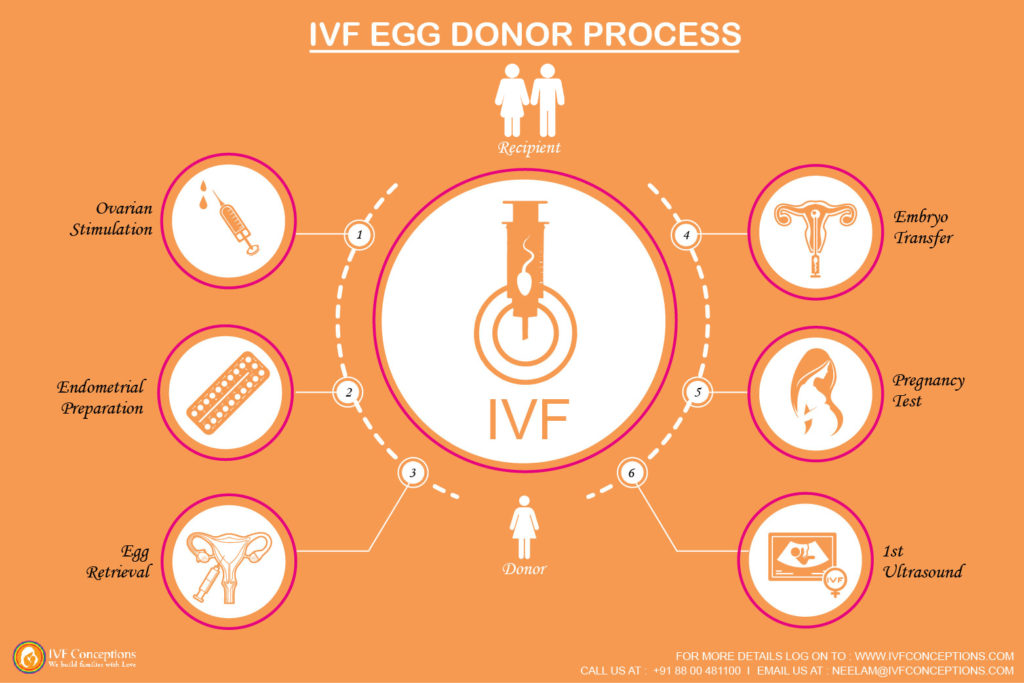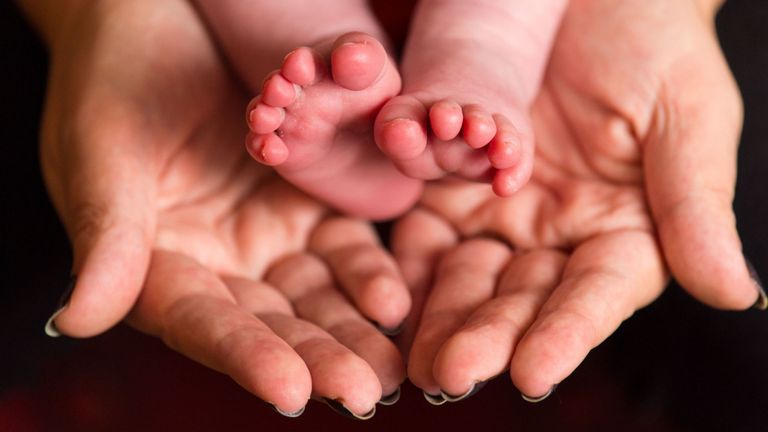By following the tips to overcome IVF failure, intended parents can prepare for successful outcomes.

Assisted Reproductive Techniques (ART) is a boon for childless and infertile couples. It includes IUI, IVF, and many more. IVF (in vitro fertilization) is a tedious process. One should have enough patience when going for IVF as it may or may not turn out to be successful. However, following tips to overcome IVF failure, can prepare them for the next IVF cycle.
IVF success rate varies in each case. IVF treatment is a long process and consists of 5 steps:
- Pre-cycle diagnostic testing
- Ovarian stimulation to produce multiple eggs
- Egg retrieval from each ovary
- Fertilization of the eggs-sperms in the laboratory by traditional fertilization or ICSI
- Embryo Transfer to the uterus of the female partner
But even after such a long process, there is no guarantee that the IVF process to be successful. In case it is unsuccessful, the intended parents become restless, cry, and suffer a lot. IVF failures are more difficult for a female partner as IVF treatments are more physically and emotionally draining for them. It goes without saying that financially it is a huge loss as well.

Intended parents should not take the IVF Process failure to their hearts. Here are the tips to overcome IVF failure –
Tip #1. Don’t blame yourself for a failed IVF cycle
Remember nature is doing its job. It is not you or anyone to be blamed for the failed IVF procedure. You have done nothing wrong or bad. The clinic also has planted the embryo in your uterus properly. It is just these things that are not in control of anyone. This is just biology and you could do nothing – really nothing to influence the successful implantation. If you want, cry. Crying eases the grief and prepares the room for the next step. Accept what has happened and where are you standing now.
Tip #2. Make a Plan for the Next IVF Treatments
Once you have accepted that you had an unsuccessful attempt at IVF, decide what you want to do next. Whether you want to take a break or want to go for the next cycle immediately. Do your research as to what you want to do after the unsuccessful IVF attempt. Discuss with your partner what should come next. Whether you want to try to still get pregnant or take a break.
Tip #3. Don’t tell the whole world
It is natural for a human being to share the grief to prevent oneself from going into depression. So, tell only a few people about what had happened.
Even before trying the next cycle tell it about only selected people. Try to be personal and avoid telling each and everything to all. Even if you are telling about it to the selective people, don’t tell them exactly when you are planning and when you are planning to do a pregnancy test and other stuff.
Tip #4. Know that you will have negative thoughts
“I am good for nothing”, “It feels like a failure”, and “I won’t be a good mother”, are some of the negative thoughts that will pop up in your mind. These are natural things to come to your mind but do not believe them. Remember, the mind does what it wants to do and you can do nothing about it. But don’t entertain these thoughts if you want to be happy. I know it is difficult but it is required!
Tip #5. Talk to people who also had undergone failed IVF procedure
It is a cliche but the truth as well, the one who has experienced knows better. During and after your attempts at IVF, you will feel very’ alone.’ But you’re certainly not alone.
Around one in seven couples are having trouble conceiving. Fortunately, it’s also something that more and more people are talking about now. So, if you think it’s going to help, enter one of the online discussions, like those on Fertility Friends or find Instagram’s fellow cycle buddies. It helps to talk about what a weird mix of emotions it’s all about–rage, frustration, envy, fatigue, fear, etc. They are all valid emotions and the less taboo the more we talk about IVF.
Tip #6. Try to heal yourself
You have been through an emotional and physical ordeal, so giving yourself time to grieve and heal is important. Take some time off and regenerate yourself for some dressing-gown days.
After an IVF cycle, it can take weeks for your cycle to return to normal, which can be very frustrating. Some people are quite fortunate and their period has come back relatively fast, but some people are waiting for months.
At least it means that you’re back to ‘normal’ and can start trying again –either with IVF or, of course, it’s also the definitive sign that you’re definitely not pregnant. Using acupuncture, you can try to get back to your cycles quickly.
Tip #7. Do things that make you feel happy
You should try out the things that you would have avoided if you were pregnant.
So, you can get drunk, and try some hardcore activities. Plan a holiday and go for it. After all, you have a right to spoil yourself right now and you deserve it. One must relish those things that they enjoy. Also, buy or experience what makes you happy.
More resources on fertility topics:
10 easy tips to follow for a successful IVF Cycle

Moving Forward: What to Consider in Subsequent Cycles
Considerations for Another IVF Cycle
When contemplating another IVF cycle, it’s essential to consider various factors. From understanding success rates to reviewing the process, careful planning is key. Learn how to approach the decision-making process with optimism.
Exploring Alternative Options: Surrogacy and More
If IVF continues to present challenges, exploring alternative options becomes important. Delve into surrogacy, genetic testing, and other avenues that could lead to a successful parenthood journey.
Optimizing the Next Steps:
- Consult with Your Fertility Specialist: Schedule a thorough debrief with your fertility specialist to understand the reasons behind the IVF failure. This can inform adjustments to future treatment plans.
- Explore Alternative Paths: Consider alternative fertility treatments or options, such as donor eggs or surrogacy. A flexible approach can open new doors on your journey to parenthood.
- Educate Yourself: Stay informed about advancements in fertility treatments and research. Knowledge empowers you to make informed decisions and stay proactive.
- Connect with Others: Engage with a community of individuals who have experienced similar challenges. Sharing stories and insights can provide valuable perspectives and a sense of camaraderie.
Conclusion
Being an IVF patient is not easy!! So, stop grieving get on your toes, and plan what you would like to do next. Don’t blame yourself for anything. There is no one to be blamed and kindly do not entertain your negative thoughts. Be happy and plan your next move. See if you need donor eggs to be successful if the female partner is in the higher age group.
Look out for the sperm donor, if the doctor suggests male infertility. If required, go for egg freezing.
Read more about infertility in males and females:
Cause of male infertility and how to manage it?
Difference between IVF and IUI
Mover forward for subsequent cycles. Speak to your fertility doctor about how you can have a better IVF success rate in your next cycle.
If you’d like to learn more about IVF, Egg Donation, or surrogacy Consulting services globally, check out the rest of our website at IVF Conceptions. We offer legally secure and affordable surrogacy consulting services for FREE.
Our team has over 13 years of experience facilitating surrogacy arrangements, egg donation, and serving as an advocacy resource for infertile couples and LGBTQ individuals seeking to build families. Till now we have helped and supported thousands of the intended parents with their family-building journey, and we can help you as well. Happy to share the references from the past IPs if needed.
Our founder and chief surrogacy consultant, Neelam Chhagani, passionately helps couples struggling with fertility challenges. Since starting our surrogacy consulting agency in 2013, we’ve helped welcome over 500 babies for intended parents nationwide.
Our team includes experts from diverse backgrounds with leading reproductive attorneys, professionally trained top fertility doctors, former surrogacy case managers, experienced and kind surrogate mother and egg donor coordinators, mental health professionals specializing in infertility counseling, and a logistic support team to assist you in your chosen surrogacy country.

Tips To Overcome IVF Failure FAQ
What are the most common reasons for IVF failure?
There are several factors that can contribute to a failed IVF cycle, including issues with IVF medication dosage, embryo quality, implantation failure, and ovarian response. Additionally, a woman’s age can significantly impact the success of an IVF cycle.
How should I cope with grief after a failed ivf cycle?
It’s important to remember that failure can be devastating and it’s okay to grieve the loss of a potential live birth. Don’t blame yourself, and take the time to counsel and seek support from a professional or support group to help you through this difficult time.
Should I consider another IVF cycle after a failed IVF attempt?
If your IVF cycle fails, it’s crucial to understand that it doesn’t mean IVF success won’t be achieved. Many individuals go through multiple failed cycles before reaching a successful pregnancy. Talk to your fertility clinic to explore the next steps and consider another IVF cycle or alternative fertility treatment such as in vitro fertilization (IVF) or IUI.
What are some tips for preparing for the next IVF cycle?
When getting ready for the next IVF cycle, focus on self-care and mental well-being. This may involve optimizing your lifestyle, improving diet and exercise, and minimizing stress. Moreover, discuss any concerns with your IVF clinic and consider genetic testing or other adjustments necessary based on the prior failed cycle.
More Resources:
- American Society for Reproductive Medicine (ASRM): https://www.asrm.org/
- The American Infertility Association (AIA): https://resolve.org/
- Family Equality Council: https://www.familyequality.org/
- National Center for Lesbian Rights (NCLR): https://www.nclrights.org/

